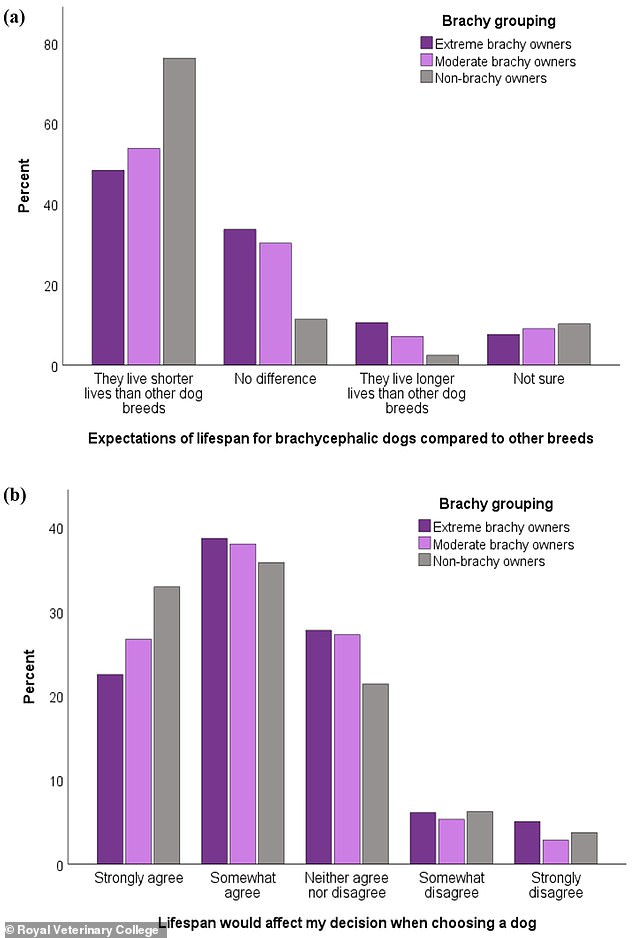Why pugs and bulldogs are still so popular: Flat-faced dog owners see laziness as a GOOD thing – rather than a sign that their pet is unwell, vets warn
With their squashed noses and curled tails, pugs and bulldogs have become favorites among dog lovers and celebrities.
But flat-faced breeds come with a whole host of health problems, ranging from breathing problems to spinal deformities.
Despite this, owners of flat-faced dogs are more likely to view laziness as a good thing rather than a sign that their pet is unwell, experts warn.
New research from the Royal Veterinary College (RVC) has found that the extreme conformations of French Bulldogs, Pugs and English Bulldogs have normalized.
And despite a high risk of developing significant respiratory problems due to their flattened faces, eye disorders due to their bulging eyes and skin infections due to their deep skin folds, many owners still believe that ‘nothing’ can stop them from purchasing the breeds.
The research involved an online survey of more than 2,000 dog owners in Britain, including those who currently own ‘extreme’ brachycephalic – flat-headed – dogs.
Analysis revealed that these owners viewed ‘laziness’ as a highly desirable trait, even though it could indicate that their dog has respiratory or musculoskeletal problems that prevent him from being active.
This preference for ‘laziness’ was greater among owners who admitted they didn’t do much research before buying their dog, the poll found.
With their squashed noses and curled tails, pugs and bulldogs have become favorites among dog lovers and celebrities. But flat-faced breeds come with a whole host of health problems, ranging from breathing problems to spinal deformities
Experts warned that this common trait seen in flat-faced breeds is often due to an intolerance to exercise due to brachycephalic obstructive airway syndrome (BOAS).
This is a serious health problem that often occurs in these breeds due to extreme conformations, including the flat face that causes the dogs to have difficulty breathing and the ability to move.
One in seven owners also reported that ‘nothing’ could stop them from owning a dog with extremely flat faces, especially those with a strong preference for flat faces and those who did not believe it shortened a dog’s lifespan.
The same percentage of owners also said they found their dog on social media – almost three times as many as those who owned non-flat-faced breeds.
The researchers said more needs to be done to raise awareness of the plight of these dogs, along with positive messages to promote other breeds.
Dr. Rowena Packer, senior lecturer in companion animal behavior and welfare sciences at the RVC and lead author of the study, said: ‘The limited success of campaigns trying to tackle the popularity of brachycephalic dogs is a growing frustration of the animal welfare and veterinary sectors. .
‘This research highlights the widespread normalization of signs of ill health in brachycephalic dogs, with even owners of non-brachycephalic dogs viewing signs of illness as desirable ‘personality traits’.
‘Another major concern is the significant proportion of owners of extremely brachycephalic dogs who feel that nothing can stop them from acquiring these problematic breeds.

One in seven owners also reported that ‘nothing’ could stop them from owning a dog with an extremely flat face, especially those with a strong preference for flat faces and those who did not believe it shortened a dog’s lifespan.
‘Future strategies to tackle the brachycephalic crisis must move beyond presenting purely health-based data in generic public venues, and instead positively present possible alternative breeds, challenge false beliefs and leverage human stories of brachycephalic owners to have a greater impact.
“Additionally, specifically targeting these posts on social media and puppy selling platforms can increase their effectiveness.”
The study was conducted in collaboration with researchers from the Blue Cross and was published in the journal Pets.
Previous research has shown that flat-faced breeds have a 40 percent increased risk of death compared to other breeds.
For example, popular French bulldogs have an average life expectancy of 9.8 years, compared to border collies, which live about 13.1 years.
